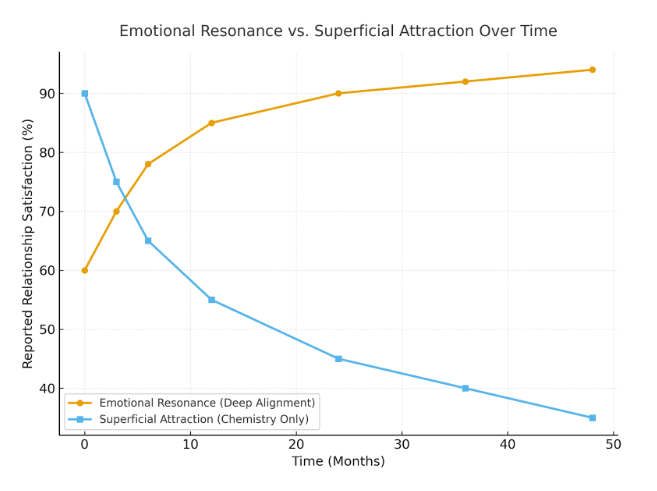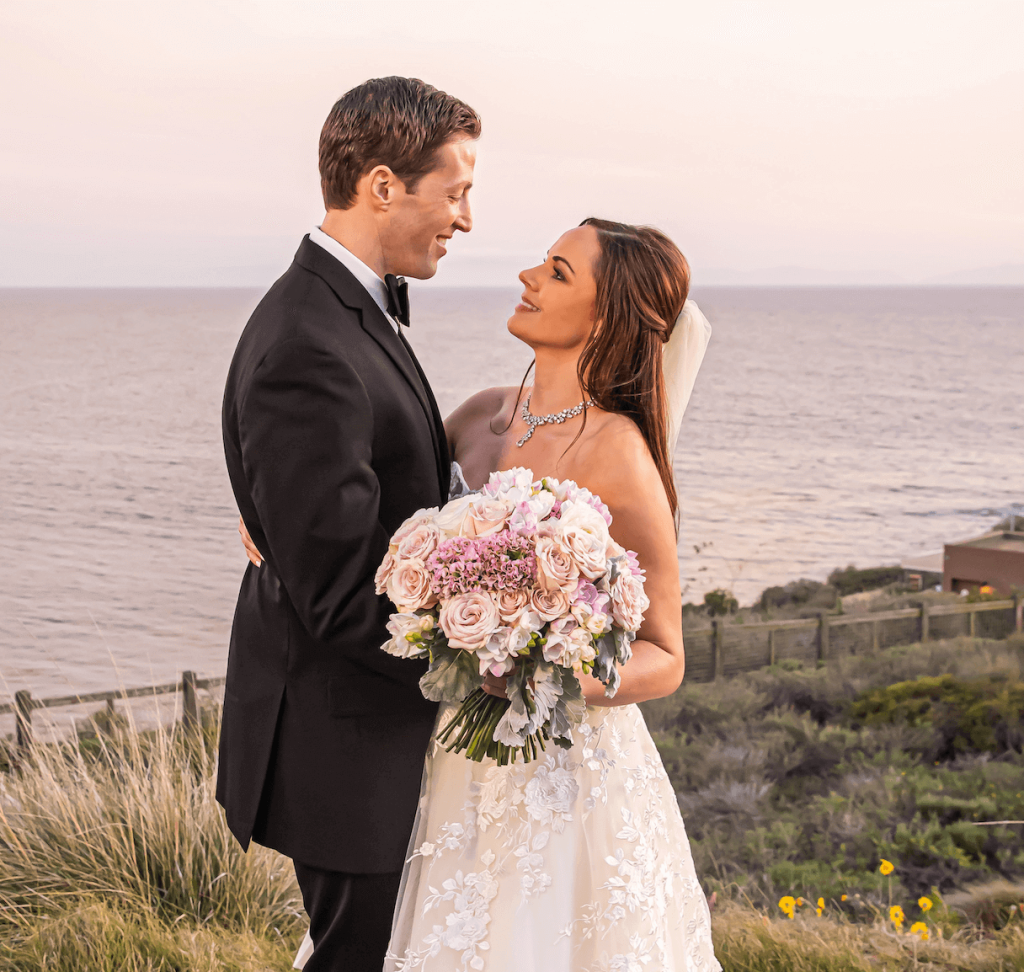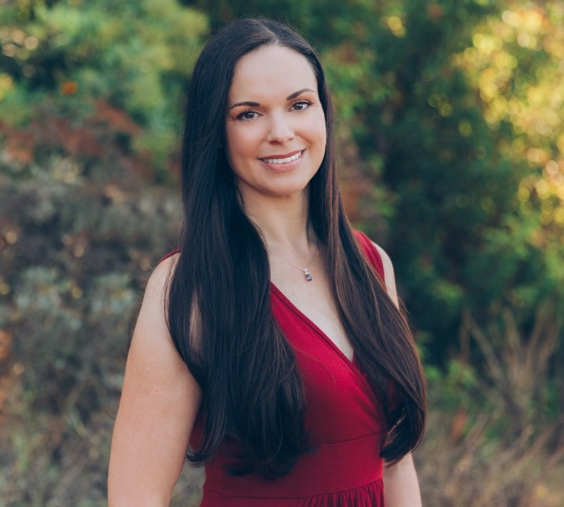The Algorithm of Love: How Trusting Myself Beat the Swipe Statistics

Once I felt ready to put myself out there and date again at 37 1/2, I had taken about two years to work on myself and reflect on what I truly wanted in a relationship. I waited until I knew with absolute certainty that I could meet a high-quality person and have the type of relationship I wanted, and that it was possible for this to happen quickly and easily. When I joined Bumble, I wasn’t swiping out of frustration or doubt — I decided to step into dating from a place of confidence, clarity, and self-trust. Years of past experiences had taught me what I didn’t want, and I was ready to apply those lessons and attract what I wanted.
The Problem: Choosing with the Wrong Energy
If you’re anything like I was before I became aware of my patterns, you may be choosing men with your masculine energy. This looks like evaluating them on external qualities such as their level of education or what they do for work, or in the initial attraction you may feel for them right off the bat. I used to do the same — focusing on their looks, status, or accomplishments that had nothing to do with what kind of partner they would be. I’d also get wrapped up in the instant chemistry I felt for certain men, completely ignoring how I felt about myself when I was with them (which, in hindsight, wasn’t very good at all). I often felt this kind of chemistry with men who were emotionally available in some way, or the ones who weren’t going to be into me for the long haul. I often overlooked the men who wanted a committed relationship and treated me with care, loyalty, and respect. I was unintentionally filtering out the very people who could have given me love and relationship I wanted!
The Shift: Choosing with Feminine Energy
The breakthrough came when I started letting my feminine energy guide my choices. Feminine energy focuses on intuition, presence, and how it feels to be with someone, rather than on checklists or instant chemistry. I began asking myself, “When I’m with this person (both when they’re right in front of me and when they’re not), how do I feel about myself?” and really paying attention to the answer. I learned that real chemistry and lasting attraction can grow over time with the right person. By focusing on presence and letting men show me who they were (rather than trying to control the outcome), I stayed open to possibilities, which allowed me to notice who truly aligned with me on a deeper level.
The Result: Meeting My Husband
Once I decided to give online dating a try, I met my husband just 24 hours after joining Bumble. His profile actually said “Not sure yet” in the “What are you looking for?” section. Most advice would have me swipe left (especially given my age and desire to have a child) but I listened to my intuition and was curious to learn more. There was nothing in our profiles that would indicate that we’d be a compatible match. We didn’t have any shared hobbies, interests, or professional overlap. He also lived about an hour away from me, which was outside of the geographic range where I would normally date. But after a few dates, we realized that we’re perfectly aligned in what truly matters in a relationship — the way we approach life, our values, and the respect we have for one another fit seamlessly. We feel a lot of attraction and chemistry with each other, but it was very different than that instant “spark” I used to feel with men who were emotionally unavailable.
We were married a year later, and now we have a child together. Our relationship and love for each other continues to grow stronger every day. This proved something powerful: the algorithm of love isn’t about superficial compatibility or rules — it’s about alignment on the internal qualities that matter most.
Why This Works: The Data Behind the Intuition
While my story is personal, research supports the principles I followed. Studies on long-term couples show that shared positive emotion — what psychologists call positivity resonance — predicts significantly higher marital satisfaction over time (Major & Sturge-Apple, Emotion, 2022). That aligns perfectly with my experience: my husband and I may not have many shared hobbies, but we deeply align in how we approach life and in the emotional climate we create together.

Research also shows that mindfulness and acceptance practices help reduce relationship conflict and prevent emotional burnout while dating (Carson et al., Journal of Contextual Behavioral Science, 2021). That resonates with the way I approached dating — staying present and emotionally grounded instead of trying to control the outcome.
When it comes to intuition, a 2022 study found that women often describe intuitive knowing as a full-body sense of clarity and calm when something is right — and tension or unease when it isn’t (Wild & Ratcliffe, Journal of Humanistic Psychology, 2022). Learning to trust that internal guidance helped me recognize emotional alignment relatively quickly, even though we didn’t look like an obvious match on paper.
How To Recognize Emotional Resonance and Deep Value Alignment
Emotional resonance isn’t about shared hobbies or interests — it’s about how your nervous system responds when you’re with someone. You know you’re in emotional alignment when you feel calm, open, and like you can be yourself in their presence. You don’t feel the need to perform, impress, or win their approval. With the right person, your energy feels met, not drained or confused.

Deeper value alignment shows up in the way you both approach life — how you handle stress, communicate, tackle challenges, accomplish goals, and resolve differences. You might not agree on everything, but there’s mutual respect and curiosity instead of defensiveness or feeling like you have to constantly explain yourself. You feel emotionally safe sharing your truth, even if it’s not “pretty.” You can share your thoughts freely without worrying how they’ll be received.
In contrast, when you’re not in emotional resonance, there’s a subtle feeling of tightness or performance. You might find yourself overexplaining, overgiving, or trying to keep the connection alive through one-sided effort rather than mutual flow. The energy feels “off,” even if you can’t logically explain why.
Alignment isn’t perfection. It’s the feeling that you’re on the same team, even when you see things differently. It’s emotional safety, not constant agreement. Deeper value alignment also reveals itself through how someone moves through life — not just what they do, but the energy behind it.
This is why it’s so important to trust your body’s feedback rather than the checklist in your head. Emotional resonance can’t be manufactured or logically reasoned into existence. When it’s there, it creates a sense of grounded ease that allows love to unfold naturally over time.
Here are some helpful questions to ask yourself:
- Do I feel emotionally safe to be myself with this person?
- Is it easy to know where I stand with them?
- Are their words and actions consistent?
- Do they make it clear that they’re interested in the kind of relationship I want?
- Do they communicate directly, without blaming or withdrawing?
- Do they treat others with respect and empathy?
- Can we disagree and still stay connected emotionally?
- Do I feel like more of myself around them?
- Can we repair and reconnect easily after disagreements?
- Does being with this person bring out my best self?
- Are we aligned in how we treat people, time, money, and commitment?
When the answer to most of those is yes, that indicates emotional resonance — and that’s the kind of alignment that predicts long-term satisfaction, not whether you both love hiking or sushi.
What Helped Me in My Dating Journey
If you’re struggling with dating, here’s what helped me the most. First, I tuned into what part of me was choosing potential relationship partners. I noticed whether I was choosing men based on masculine logic — external criteria, checklists, and superficial chemistry — or whether I was allowing my feminine intuition to guide my choices. This shift in awareness changed everything about how I approached dating.

Next, I trusted my feelings. I paid attention to how it actually felt to be with someone — how relaxed I felt around them, and how easy it was to be myself in their presence. It’s easy to get caught up in appearances or accomplishments, but my emotional response proved to be a far more reliable compass.
I also learned to detach from the outcome. I stopped trying to force results or convince someone that we’d be perfect together. Letting authentic connections unfold naturally, without judgment or pressure, helped me notice who truly aligned with my energy and values.
I learned to value emotional alignment above all else. Internal qualities like shared values, mindset, and communication style mattered far more than hobbies, interests, or external traits. These internal alignments created a deep, lasting connection that sustains a relationship for the long term.
Finally, I stayed open to the unexpected. The right person might not look or act like what you imagined, and they may even surprise you in ways that feel unfamiliar at first. My husband didn’t check all the boxes I initially thought mattered — and yet he turned out to be the perfect match for me.
The chemistry and attraction we feel for each is so much stronger than anything we’ve felt before, and it continues to grow over time. This is very different than the superficial kind of chemistry that can create a feeling of longing for someone who’s not right for you. Staying open allowed me to see what truly mattered beneath the surface.
The Algorithm of Love
My experience taught me that the “algorithm” of dating isn’t coded in checklists or rules — it’s coded in your energy, your intuition, and your choices. By trusting myself, tuning into my feminine energy, and listening to my intuition, I met my husband quickly and we built the family I’ve always dreamed of together.
Love isn’t about formulas or following rules. It’s about knowing your value, trusting yourself, and choosing based on emotional resonance and true alignment. When you do that, even the most unlikely match can become the perfect one!
References
1. Positivity Resonance in Long-Term Married Couples
Major, B., & Sturge-Apple, M. L. (2022). Positivity resonance in long-term married couples: Shared positive emotion and marital satisfaction. Emotion, 22(5), 997–1008.
2. Effects of a Mindfulness and Acceptance-Based Program on Intimate Relationship Conflict
Carson, J. W., Carson, K. M., Gil, K. M., & Baucom, D. H. (2021). Effects of a mindfulness and acceptance-based program on intimate relationship conflict and satisfaction. Journal of Contextual Behavioral Science, 19, 90–98.
3. Women’s Experiences of Intuition: A Phenomenological ExplorationWild, K., & Ratcliffe, M. (2022). Women’s experiences of intuition: A phenomenological exploration. Journal of Humanistic Psychology, 62(2), 231–249.
